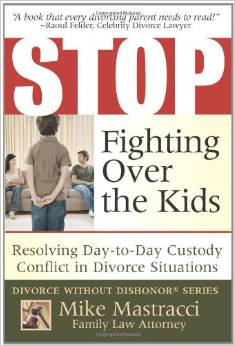
Mike Mastracci is familiar with the process of child custody
cases. Here is just a snippet of his book for you to learn more.
Mike Mastracci is familiar with the feelings, motives, actions, and results of child custody chaos. He has worked as an attorney for nearly twenty years and has served as counsel on more than his fair share of divorce and custody cases. He is also intimately familiar with the stress and strife that come with an ugly divorce and complicated child custody arrangements. All of his experiences have led him to write a book about the effects of divorce on children and how to get parents to come to a reasonable agreement. Here is just a snippet of his book for you to learn more.
“Splitting the Baby”
When there is an ongoing fight over child access, it is important to realize that the term stability, in the context of fighting over the division of parental time, is an oxymoron if there is no agreed-upon schedule. For example, in some cases, one parent may somewhat disingenuously stress that access to the other parent must be limited for the sake of the child’s stability. However, when there is an ongoing power struggle to maximize or minimize parental time, the child’s life is anything but “stable.”
The theories or justifications of years past that subscribed to the notion that a child needs to only regard one parent’s house as “home” and that he must sleep in the same bed every night is far less important than often proclaimed. These days, many experts suggest that a rigid “every other weekend and one or two nights a week for dinner” visitation schedule is a minimum type of arrangement. For separated or divorced parents, this is not necessarily the preferred norm.
The Child’s Best Interest
The best interest of the child standard is not supposed to be a test on “good parent” vs. “bad parent” decision-making. However, although some state courts may characterize the criteria and terminology differently, the gist of the court’s reasoning in deciding who custody is to evaluate certain “factors.” The court examines these factors and weighs the advantages and disadvantages of each parent’s alternative environment. The criteria for judicial determination include:
- Fitness of the parents
- Character and reputation of the parties
- Preference of the children
- Material opportunities affecting the future of the children
- Age, health, and sex of the children
- Residences of parents and opportunity for visitation
- Length of separation from the natural parents
- Prior voluntary abandonment or surrender of the child or children
Conclusion
From these chapter snippets, we learned that the ongoing struggle to maximize the time a child has with one parent over the other only leads to more stress for the child. “Splitting the baby, as Mastracci puts it, is really an act of one parent justifying their competency over another. In fact, the child’s best interest should be paramount in divorce and custody agreements. The child should stay with whichever parent will provide them with a stable, healthy, and happy living arrangement.
Check us out next month for another snippet of Attorney Mike Mastracci’s book Stop Fighting Over the Kids.
The Right Lawyer Can Make All the Difference
Hiring a lawyer should be the first thing you do when encountering any legal matter, not a last resort. Whether you’re thinking about a separation or divorce or have been charged with a crime, been injured in an accident, or your civil rights have been violated, you need to first know your rights. Contact Mike Mastracci today at 614 Edmondson Ave Catonsville, MD 21228 (with satellite offices in Ocean City, Snow Hill, and Salisbury, Maryland), 410-869-3400, and check us out on Facebook.
